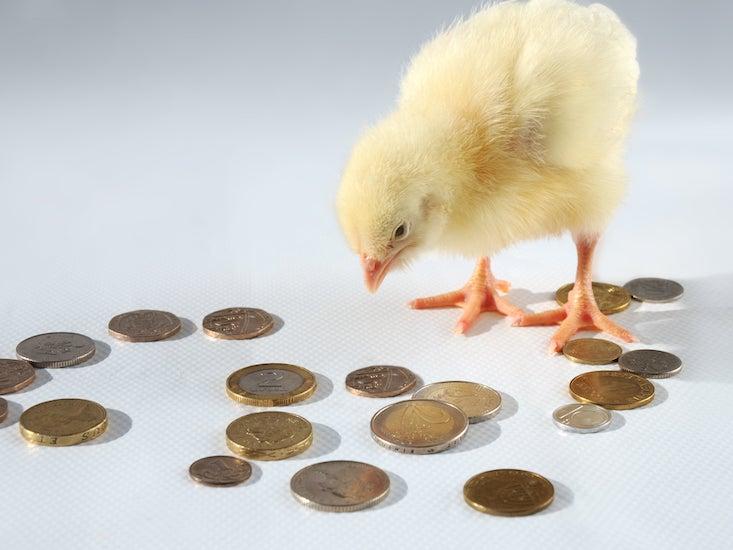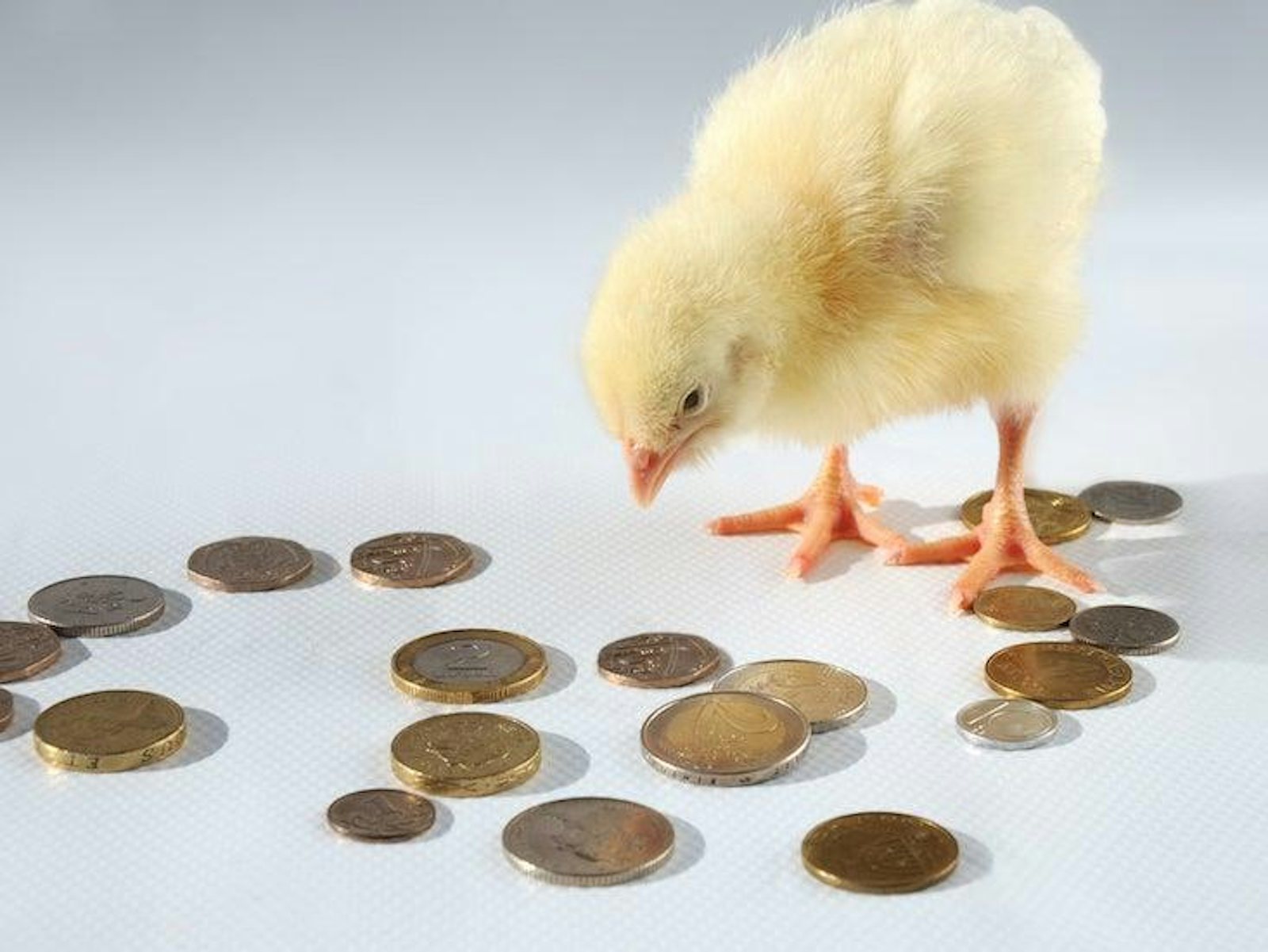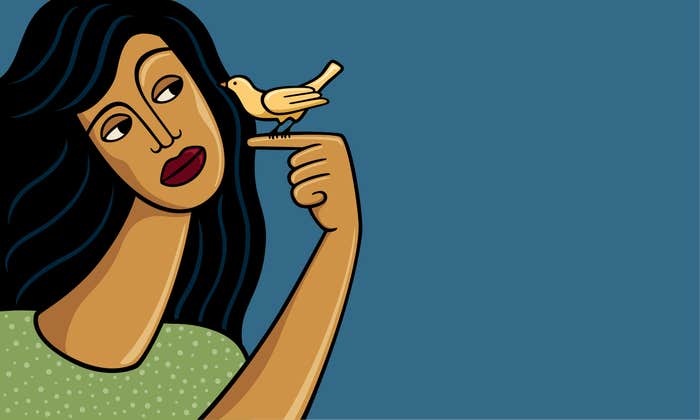
By now everybody’s heard about the terrible treatment that pigs and chickens get in factory farms. For many, the solution seems obvious: eat less meat. But let’s look at that solution in terms of how effective it is.
According to data from the U.S. Department of Agriculture, the average American eats about 30 farm animals per year, not including seafood. But on top of that, more other animals die in the process of getting them to the table—from stress in transport, male chicks being killed shortly after hatching, being crushed by other animals, fed to other animals, and so on. The average diet globally results in about 105 animal deaths. What if you went vegan, and avoided eating all animal products? You would prevent the suffering of about 105 animals.
Veganism is just one way to help animals.
This doesn’t mean that there would be 105 more animals living happy lives, though. (For wild fish, it would mean they were not caught.) Rather, it would reduce demand for animal meat, and result in farmed animals not living through the hell of a factory farm. They would never exist at all. Given that life in a chicken factory farm is considered by many experts to be worse than not living at all, this is doing some good for animal welfare. So when I talk about a “saved” chicken life, what I mean is the prevention of the very existence of a hypothetical chicken who would have lived, suffered, and died in a factory farm.
But 30 eaten animals is just the average: there are just as many people who eat more than 30 animals per year as there are people who eat fewer. Part of this depends on what kind of meat one eats. Cows are treated much better than chickens, but, more importantly, they are about 155 times bigger. You could eat beef every night for five months and still eat fewer animals than if you ate two chickens.
But let’s look at the kind of person who would become vegan. How many animals would they eat if they ate meat? Or, to put it another way, before somebody goes vegan, how many animals did they eat? For most vegans, the answer is probably lower than the population’s average. Some people are vegan (or are better able to maintain veganism) because they don’t like meat as much as others like meat. But let’s assume, just for simplicity, that if a vegan started eating meat, they’d eat what the average American ate, and so, by virtue of their vegan diet, they are saving 105 animals a year. That’s the immediate effect of veganism on animals, though there are other, indirect effects, such as making veganism more socially acceptable to others.
A recent movement, effective altruism, tries to put numbers to the good and bad that people do with their actions. There are charities out there, for example, that specialize in reducing the harm done to animals by trying, primarily, to get companies to buy more ethically raised animals. One of these top charities, according to Animal Charity Evaluators, a nonprofit animal advocacy and research organization, is The Humane League. An estimate from Animal Charity Evaluators in 2018 has it that The Humane League “spares between -6 and 13 farmed animals per dollar spent.” If we settle on the middle of this range, we can estimate that a $1 donation to The Humane League would save around 3.5 animals, mostly chickens.
A meat-eater, then, who donates $100 to the Humane League is saving 350 animals—over three times as many animals as they would maintaining a vegan diet for one year. There are other estimates of the effectiveness of this and related charities, but whatever numbers you use, the result is pretty stark—the animals killed or saved by altering your diet is pretty small compared to the good you can do for animals with a small donation. For the vegans who donate to effective animal welfare charities, their diet is a small fraction of the good they’re doing, even if it’s the most conspicuous.
This strikes many people as the wrong way to think. Tied up in our ideas about being good is a notion of self-sacrifice. A person seems better to us if they do good through self-deprivation. Since it’s a lot easier for most people to donate $100 to a charity than to be vegan for a year, it kind of feels like cheating.
But veganism isn’t easy for everybody. Five out of every six people who try to do it eventually go back to eating at least some meat. What I’m suggesting here isn’t to not be vegan, but to know that it’s just one way to help animals, and there are other ways to help the same number of animals. Would it be easier for you to donate 30 bucks to The Humane League or to give up animal products for a year?
Of course, you can do both. I’ve brought this up with animal-welfare enthusiasts and a common response is that you should be vegan anyway, even if you donate lots of money. But if we’re looking at effectiveness, this is like saying, “Well, you donated $100, if you really cared you’d donate $300.” Just about everybody can do more good than they are currently doing, without even sacrificing much (or any) of their own welfare. You can always argue that one should save yet another 105 animals by being vegan or by donating another $30 to The Humane League.
I’m okay with that. I think most people in the Western world should be giving more. But if you’re considering trying to be better to animals this year, consider donating to an effective animal-welfare charity—whether you’re vegan or not.
It’s a new year’s resolution that you’ll probably be able to keep.
Jim Davies is a professor at the Department of Cognitive Science at Carleton University. He is co-host of the award-winning podcast Minding the Brain. His latest book is Being the Person Your Dog Thinks You Are: The Science of a Better You.


























